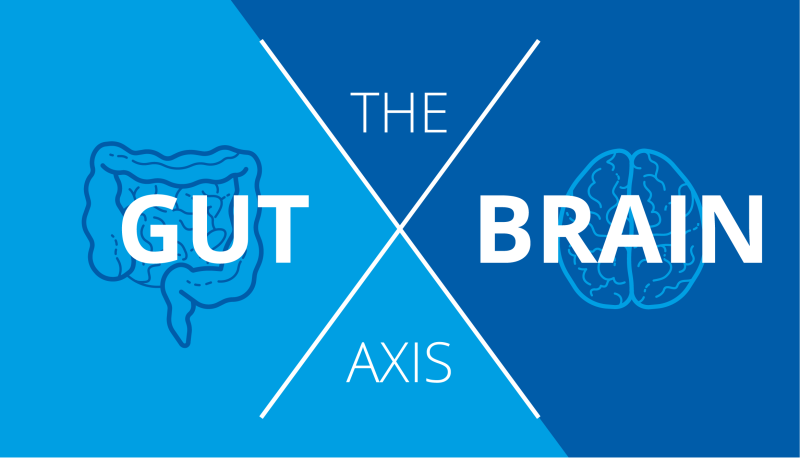
The Gut-Brain Axis: How Your Gut Dictates Your Mental Health
How the Gut and Brain are Connected
If someone told you that you have two brains, you’d probably laugh them out of the room, right? You’d be like, “Hey Dave, who invited that guy to the party?” Ok, so obviously you don't have two brains. But what you do have are a brain and a gut that are more complexly and completely connected than you might have originally known or suspected, to the degree that one intimately affects the other. “Ok, BROYA blog, tell me more…” we hear you saying. Happy to oblige!
Our guts contain a microbiome. What is a microbiome, apart from a really cool sounding word? A microbiome is essentially a collection of gut bacteria, both good and bad, that live within us in symbiosis. Microbes are part of our regular “flora” and our intestines are jam-packed with them. In fact, it has been determined that there are approximately 100 trillion unique microbes within one person’s microbiome, reflecting 10,000 different species. Yes, that’s right, you read correctly. Our bodies are incredible. And terrifying.
Ok, so now that we know about the microbiome, how in the world does this relate to our brains? Essentially, the “gut-brain axis” is a biochemical signalling system that exists between our gastrointestinal tract and central nervous system. For those who prefer a metaphor, think of a whole series of telephone wires or invisible highways connecting one part of the body to another. What this means is that bacteria found within our guts are actually able to control important levers within our nervous systems, intrinsically linking our gut to our brains.
What does this mean?
This means that we are, in many more ways than we may have known, what we eat.
How Gut Bacteria Affects Us Mentally
Ok, so if gut bacteria now have a say over what’s going on in our brains, what does that mean? Well, just like with anything else, this bacteria can have a good or bad influence over our mental health and cognitive functions.
The Good
A healthy microbiome is filled with happy and helpful bacteria that have our best interests at heart (er…. stomach?) Gut microbes actually produce 50% dopamine and 90% serotonin (the “feel good” chemicals that regulate our mood). They also absorb, break down and assimilate nutrients from our diets, and essentially help to fuel and sustain every process in our bodies.
If we have a healthy gut, the lines of communication between our gut and brain function effectively. When our gut is functioning at its best, it also produces adequate serotonin and effectively sends and regulates signals to do with hunger, satiety, anxiety, learning and memory (to name a few).
When our gut is full of good bacteria, we will feel, for lack of a better word, good.
Ok, but there’s a flipside to this, right?
The Bad
Naturally, if an abundance of good gut bacteria can help us to thrive mentally and emotionally, then an overabundance of bad bacteria will do the opposite.
Unfortunately, bad bacterial growth is affected by digestion. When our digestion isn’t functioning at its best, it can prevent proper nutrient absorption (meaning we’re not getting the nutrients that our bodies need to thrive). The even more insidious side of poor digestion? It allows undigested food particles to build up in our GI and these attract bad bacteria. Poor digestion can then lead to the bad bacteria outnumbering the good bacteria in our guts. And what does this mean for our nervous systems? Well, essentially it means that the lines of communication between our brains and guts are now being controlled by a bunch of bad guys. Essentially, data is now being collected and sent to our brains saying there is something seriously wrong with our guts. Wuhwoh.
How does our brain respond to this kind of message? Not well, as you can imagine. An overabundance of bad bacteria in our guts can trigger anxiety, depressive-like behaviours, mood swings, and irritability. If an imbalance continues and is prolonged it can cause more sustained problems like obesity and addiction. Interestingly, IBS is actually considered by some to be a “gut-brain axis disorder”, where anxiety and depression can at times coexist with digestive symptoms and both mental and physical symptoms seem to continually exacerbate each other.
Ok, so this is all kind of grim. What can we do about it?
How to Support Your Gut and Mood
Eat Your Greens
It stands to reason that if our nervous system is affected by our gut, and if our gut is affected by our diet…. then we should probably be pretty darn focused on maintaining a healthy one. Steamed vegetables might remind some folks of grandma’s house, but they’re on the plate for a reason (or thirty). Steamed veggies are rich in fibre and act as “prebiotics” to help feed and repopulate healthy gut bacteria. If you are looking to heal your gut, then choosing steamed veggies is especially important because they help to cook down and predigest fibre. Though nutrient dense, a diet rich in raw veggies can be quite harsh on a healing system as they require extra work to break down.
Lower Your Stress Levels
This is just good advice, in general. Ever been really stressed and gotten an upset stomach? I think we’ve all been there. Chronic high-stress levels are hard on our whole bodies, including our guts, as stress wreaks havoc on our digestive and absorptive processes and can be the culprit for all range of unpleasant GI symptoms. Consider meditation, yoga and/ or exercise to help alleviate stress.
Eat Fermented Foods and/ or Probiotics
Either you hate kimchi or you love it, but there’s no denying that it’s a gut- saver. Kimchi, sauerkraut, yoghurt and beet kvass are some excellent fermented foods that help to replenish good bacteria in our bodies. Probiotic supplements also do a good job of this and can be really helpful in maintaining the balance you need to thrive.
Drink Bone Broth
You saw this one coming, didn’t you? But seriously, bone broth is a gut- healing powerhouse. Bone broth is full of beneficial proteins called collagen and gelatin. These proteins are made of anti-inflammatory amino acids which help to heal the gut lining and protect it. What this means is that bone broth helps to create the optimal environment for good bacteria to grow, populate and support our systems.
Reduce Junk Food Intake
Now, here’s one we’ve heard before. Fatty, sugary foods and your gut just don’t really get along. A diet high in junk foods creates a breeding ground for bad bacteria, which, as discussed above, can put a strain on us both emotionally and mentally. It’s honestly just not with it.
The Moral of the Story
Basically, everything’s connected. Our brains are connected to our guts which are connected to our diets which are connected to our stress levels, etc. Our bodies are extremely complex and intricate ecosystems that thrive when the balance is restored and upheld. And we can continue to make healthy and positive choices every day to support our bodies and therefore, ultimately support our minds, and keep our gut-brain axis in check. It’s in our hands. It’s in our guts. How great is that?
Sources:
https://blog.kettleandfire.com/gut-brain-axis/
https://www.gutmicrobiotaforhealth.com/en/home/gut-brain-axis/
https://www.youtube.com/watch?v=E479yto8pyk
https://www.hopkinsmedicine.org/health/healthy_aging/healthy_body/the-brain-gut-connection
- biology /
- bone broth /
- gut health /
- gut-brain axis /
- health /
- healthy life /
- natural foods /
- science /
- super food /
- wellness /
- whole foods
